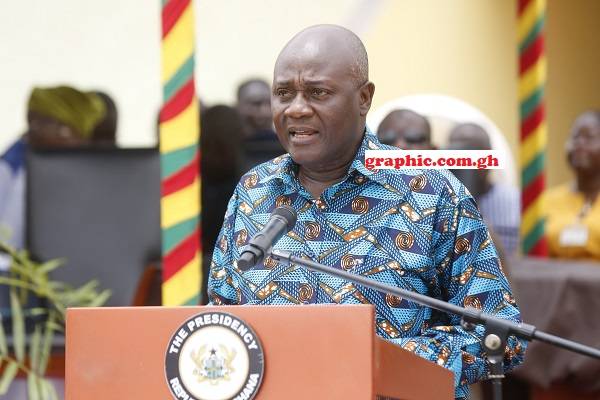To aid with flood mitigation this year, the government has given GH7.16 million to 17 metropolitan and municipal assemblies along the Odaw River through the Ministry of Local Government, Decentralization, and Rural Development (MLGDRD).
The money, which was given as part of a $200 million World Bank credit (loan) facility as part of the Greater Accra Resilient and Integrated Development (GARID) Project, will assist the beneficiary assemblies in bettering the operation and maintenance of drainage and solid waste management infrastructure in communities along the Odaw channel in preparation for this year's significant rainy season.
Moreover, the initiative intends to provide infrastructure and services in high-risk informal communities in the Odaw basin.
In order to enhance governance, operation, and maintenance of drainage infrastructure in the beneficiary assembly, the Minister of Local Government, Decentralization, and Rural Development, Dan Botwe, made this announcement during a stakeholder meeting in Accra yesterday.
Accra Metropolitan Assembly, Adentan Municipal Assembly, Ayawaso Central, East, North, and West Municipal Assemblies; Ga Central, East, North, and West Municipal Assemblies; La Dade Kotopon Municipal Assembly; La-Nkwantanang Madina Municipal Assembly; Okaikoi North Municipal Assembly; and Korle-Klottey Municipal Assembly are among them.
Meeting attendees are addressed by Minister of Local Government, Decentralization, and Rural Development Dan Botwe (middle).
Flashback
The recipient assembly received GH3,746,800 last year for the same purposes. Compactor trucks and other rubbish collecting tools were provided as part of the effort to the municipal and metropolitan assemblies that will benefit from their waste management initiatives.
The assemblies are anticipated to use their portion of this year's grant money as well as the equipment they were given to clear clogged drains, remove trash from waterways, and perform other drainage operations and maintenance tasks that will relieve the residents of the flood-prone communities along the river basin.
Caution, more responsibility
In addition to the money that was granted to them, Mr. Botwe stated that the recipient assembly were equally required to spend an extra 20% of their respective Internally Generated Funds (IGF).
He stressed that by March 29, 2023, the ministry will implement punishments, including the name and shaming of the beneficiary assembly that had done poorly the previous year. Mr. Botwe stressed that "failure to do simple paperwork and poor performance would result in the assemblies obtaining less money and thus when it rains people suffer" that each recipient assembly must have and closely follow a drainage plan in order to qualify for the award.
As a result, he urged the citizens of the recipient areas to exercise their constitutional right to hold public officials accountable for their actions.
He claimed that the MLGDRD, Works and Housing, Sanitation and Water Resources, and GARID were all participating in an inter-ministerial project called GARID.
Early warning with GARID
Dr. Kwadwo Ohene Sarfoh, the project's coordinator, gave an overview of the GARID project and explained that in addition to desilting priority drains, some grant funds would be used for institutional development, such as condition assessments of the drains in flooding hotspots, support for the drainage maintenance units, the purchase of logistics, and training.
As part of the initiative, he announced intentions to open an Accra early warning flood centre as soon as approval was received by the end of April. Moreover, a service provider will be hired to build the necessary hardware, run the centre, and transfer it once clearance has been granted.
The National Disaster Management Organization (NADMO), the Ghana Hydrological Authority, and the Ghana Meteorological Agency, according to Dr. Sarfoh, would all be well ready to assist in providing particular alerts and warnings once they are operational.


